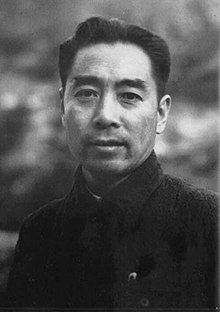

Premier of the People's Republic of China
5 March 1898 Huai'an, Jiangsu, Qing Empire
8 January 1976(1976-01-08) (77) Beijing, People’s Republic of China
1 October 1949 – 8 January 1976
1st Premier of the People's Republic of China from 1949-76 In this Chinese name, the family name is Zhou. Zhou Enlai周恩来 Zhou Enlai in the 1940s1st Premier of the People's Republic of ChinaIn office 1 October 1949 – 8 January 1976LeaderMao Zedong1st vice-premier Dong Biwu Chen Yun Lin Biao Deng XiaopingPreceded by Yan Xishan (as Premier of the Republic of China)Succeeded by Hua GuofengForeign Minister of the People's Republic of ChinaIn office 1 October 1949 – 11 February 1958PremierHimselfPreceded by Hu Shih (as the Minister of Foreign Affairs of the Republic of China)Succeeded by Chen YiFirst Vice Chairman of the Communist Party of ChinaIn office 30 August 1973 – 8 January 1976ChairmanMao ZedongPreceded by Lin Biao (1971)Succeeded by Hua GuofengVice Chairman of the Communist Party of ChinaIn office 28 September 1956 – 1 August 1966ChairmanMao Zedong2nd Chairman of the National Committee Of the CPPCCIn office December 1954 – 8 January 1976Honorary ChairmanMao ZedongPreceded by Mao ZedongSucceeded by vacant (1976–1978) Deng Xiaoping Personal detailsBorn(1898-03-05 ) 5 March 1898 Huai'an, Jiangsu, Qing EmpireDied8 January 1976(1976-01-08) (aged 77) Beijing, People’s Republic of ChinaCause of deathBladder cancerPolitical partyCommunist Party of China (1921–1976)Spouse(s)Deng Yingchao (m. 1925–1976)ChildrenSun Weishi, Wang Shu (both adopted)EducationNankai Middle School, Meiji UniversityAlma materNankai UniversityOccupationPolitician Strategist Revolutionary DiplomatSignatureWebsitezhouenlai.people.cn Military serviceAllegiance People's Republic of ChinaBranch/service People's Liberation ArmyBattles/warsEastern ExpeditionsNanchang UprisingEncirclement CampaignsSecond Sino-Japanese WarChinese Civil War Zhou Enlai"Zhou Enlai" in Simplified (top) and Traditional (bottom) Chinese charactersSimplified Chinese周恩来 Traditional Chinese周恩來 TranscriptionsStandard MandarinHanyu PinyinZhōu Ēnlái Gwoyeu RomatzyhJou Enlai Wade–GilesChou1 Ên1-lai2 IPA WuSuzhouneseTseu En-le Yue: CantoneseYale RomanizationJāu Yān-lòih JyutpingZau1 Jan1-loi4 IPA Courtesy nameChinese翔宇 TranscriptionsStandard MandarinHanyu PinyinXiángyǔ Wade–GilesHsiang2-yü3 Yue: CantoneseJyutpingCoeng4-jyu5 Zhou Enlai ( ; 5 March 1898 – 8 January 1976), Wade-Giles transliteration Chou En-lai, was the first Premier of the People's Republic of China. From October 1949 until his death in January 1976, Zhou was China's head of government. Zhou served under Chairman Mao Zedong and helped the Communist Party rise to power, later helping consolidate its control, form its foreign policy, and develop the Chinese economy. As a diplomat, Zhou served as the Chinese foreign minister from 1949 to 1958. Advocating peaceful coexistence with the West after the Korean War, he participated in the 1954 Geneva Conference and the 1955 Bandung Conference, and helped orchestrate Richard Nixon's 1972 visit to China. He helped devise policies regarding disputes with the United States, Taiwan, the Soviet Union (after 1960), India, and Vietnam. Zhou survived the purges of other top officials during the Cultural Revolution. While Mao dedicated most of his later years to political struggle and ideological work, Zhou was one of the main driving forces behind the affairs of state during much of the Cultural Revolution. His attempts at mitigating the Red Guards' damage and his efforts to protect others from their wrath made him immensely popular in the Cultural Revolution's later stages. As Mao's health began to decline in 1971 and 1972 and following the death of disgraced Lin Biao, Zhou was elected to the vacant position of First Vice Chairman of the Communist Party by the 10th Central Committee in 1973 and thereby designated as Mao's successor (the third person to be so designated after Liu Shaoqi and Lin), but still struggled internally against the Gang of Four over leadership of China. His last major public appearance was at the first meeting of the 4th National People's Congress on 13 January 1975, where he presented the government work report. He then fell out of the public eye for medical treatment and died one year later. The massive public outpouring of grief which his death provoked in Beijing turned to anger at the Gang of Four, leading to the 1976 Tiananmen Incident. Although Zhou was succeeded by Hua Guofeng as First Vice Chairman and designated successor, Zhou's ally Deng Xiaoping was able to outmaneuver the Gang of Four politically and took Hua's place as paramount leader by 1978.

We use cookies
We use cookies and other tracking technologies to improve your browsing experience on our website, to show you personalized content and targeted ads, to analyze our website traffic, and to understand where our visitors are coming from. Privacy Policy.